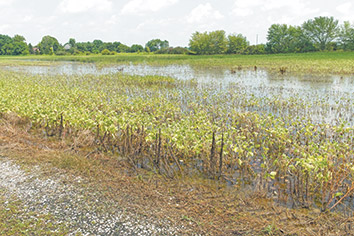Subscriber Benefit
As a subscriber you can listen to articles at work, in the car, or while you work out. Subscribe NowIndiana farmers will have to change the types of crops they sow, the timing of plantings and adapt in other ways if the climate continues to get warmer, according to a Purdue University report.
Purdue's Climate Change Resource Center released its latest report Tuesday on global warming's expected impact on Indiana. The state will likely see heavier rainfall patterns, earlier springs and hotter summers in the decades ahead, the report said.
"The climate has already changed, and it will continue to change. And if we just keep going on as normal, we are going to run into some problems," said Jeffrey Dukes, the center's director. "We are going to be at greater and greater risk of losing money if we stick with the status quo."
Warmer and wetter weather could lead to more weeds, pests and diseases, the report said. Higher overnight temperatures could also lead to a decrease in corn production. Increased temperatures could also put farm workers at a higher risk and cause livestock heat stress, researchers said.
Farmers may need to plant earlier, use different varieties of crops and install ventilation and cooling stations for livestock and workers, researchers said.
On a possible positive note, the report says longer growing seasons can "increase the productivity of food crops and forests, and could expand crop-production opportunities in northern latitudes or the possibility of double-cropping further south."
Tim Schulz, who operates Engelbrecht's Orchard in Evansville, said he's already struggled with the effects of increasing temperatures.
"It's something I've thought about. The first few summers we saw much earlier ripening dates than published for different varieties," Schulz said. "I attribute that to global warming, in general."
The planting of new tree stock was delayed this year by heavy precipitation in early spring, he said. Those trees later saw unusually hot weather.
"That heat basically baked those young trees," Schulz said. "That unique spike (in temperature) this spring was really noticeable."
Please enable JavaScript to view this content.

